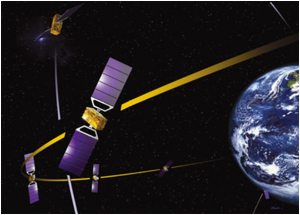If you wish to contribute or participate in the discussions about articles you are invited to contact the Editor
Galileo Services
| GALILEO | |
|---|---|
| Title | Galileo Services |
| Author(s) | GMV |
| Level | Basic |
| Year of Publication | 2011 |
The GALILEO System will be an independent, global, European-controlled, satellite-based navigation system and will provide a number of guaranteed services to users equipped with Galileo-compatible receivers. The definition of the GALILEO Services is based on a comprehensive review of user needs and market analysis[1]. The Galileo mission and services have been elaborated during the initial definition phase in consultation with user communities and the Member States.
Introduction
There will be some services provided autonomously by Galileo and other services resulting from the combined use of Galileo and other systems. This leads to the classification of the Galileo services into four categories:[1]
- GALILEO satellite-only services: These services will be provided worldwide and independently from other systems by combining the signals broadcast by the Galileo satellites. There is a wide range of possible applications with different operational requirements that have been grouped around the following five reference services:
- GALILEO locally assisted services: The Galileo satellite-only services can be enhanced on a local basis through a combination of local elements. The result will be the provision of local services.
- EGNOS services: EGNOS will provide over Europe an augmentation to GPS and GLONASS services. This service will allow for early experience in development of Galileo-like applications. The EGNOS services will be combined with the Galileo satellite-only services. This will allow higher performance levels to be met by using different sources of integrity and navigation information.
- Galileo combined services: All the above-mentioned services will be combined with services provided by other navigation or communication systems. This possibility will improve the GNSS services availability at user level and open the door to a wide range of applications. The result will be the provision of combined services.
GALILEO satellite-only Services
The following Galileo satellite-only services will be provided worldwide and independently from other systems by combining Galileo signals-in-space:[2]
- GALILEO Open Service (OS) results from a combination of open signals, free of user charge, and provides position and timing performance competitive with other GNSS systems;
- GALILEO Safety-of-Life Service (SoL) improves the open service performance through the provision of timely warnings to the user when it fails to meet certain margins of accuracy (integrity). It is envisaged that a service guarantee will be provided for this service. This service will be made available for safety-critical applications such as running trains, guiding cars, navigation and aviation;
- GALILEO Commercial Service (CS) provides access to two additional signals, to allow for a higher data throughput rate and to enable users to improve accuracy. The signals are encrypted. It is envisaged that a service guarantee will be provided for this service. The Commercial Service allows for development of applications for professional or commercial use owing to improved performance and data with greater added value than that obtained through the open service;
- GALILEO Public Regulated Service (PRS) provides position and timing to specific users requiring a high continuity of service, with controlled access. Two PRS navigation signals with encrypted ranging codes and data will be available: The Public Regulated Service is restricted to government-authorised users, for sensitive applications which require a high level of service continuity. This service is intended for security and strategic infrastructure (e.g. energy, telecommunications and finance);
- GALILEO Support to Search and Rescue Service (SAR) represents the contribution of Europe to the international COSPAS-SARSAT co-operative effort on humanitarian Search and Rescue activities. Galileo is to play an important part of the Medium Earth Orbit Search and Rescue system (MEOSAR). Galileo satellites will be able to pick up signals from emergency beacons carried on ships, planes or persons and ultimately send these back to national rescue centres. From this, a rescue centre can know the precise location of an accident. At least one Galileo satellite will be in view of any point on Earth so near real-time distress alert is possible. In some cases, feedback could be sent back to a beacon, something which is only made possible by Galileo.
During the Initial Operational Capability (IOC) phase, the GALILEO open service, the search and rescue service and the PRS will be provided. At this stage, however, accuracy and availability will not yet have reached their optimum levels.[3]
For more information about Performances of each services see the article Galileo Performances.



